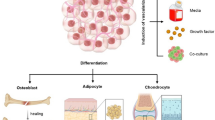Summary
An early embryo co-culture system with human decidual stromal cells was established to study its effect on early embryonic cleavage and growth in vitro. Three hundred and eight 2-cell mouse embryos were co-cultured with human decidual stromal cell monolayer in MEM + 0.4 % bovine serum albumin (BSA) and 163 embryos cultured in MEM + 15 % FCS alone as control. Among the mouse 2-cell embryos co-cultured with human decidual stromal cells, 72.73 % developed to the morula stage and 67.21 % cavitated to blastocysts with 59.74 % hatching, as compared with 61.34 % to morula stage, 48.47 % to blastocysts and none hatching in the controls, respectively. Co-cultured embryos cleaved slightly faster than controls and showed no or less fragmentation than those in the control. These results suggested that human decidual stromal cells can support early embryonic development and yield a reasonable number of embryos with good quality up to blastocyst stage.
Similar content being viewed by others
References
Gandolfi F, Moor R M. Stimulation of early embryonic development in the sheep by co-culture with oviduct epithelial cells. J Reprod Fertil, 1987, 81: 23
Olivares E G, Montes M J, Oliver Cet al. Cultured human decidual stromal cells express B7-1(CD80) and B7-2(CD86) and stimulate allogeneic T cells. Biol Reprod, 1997, 57: 609
Feng H L, Wen X H, Amet Tet al. Effect of different coculture systems in early human embryo development. Hum Reprod, 1996, 11: 1525
Bongso A, Ng S C, Sathananthan Het al. Improved quality of human embryos when co-cultured with human ampullary cells. Hum Reprod, 1989, 4: 706
Menezo Y, Guerin J F, Czyba J C. Improvement of human early embryo development in vitro by coculture on monolayers of Vero cells. Biol Reprod, 1990, 42: 301
Dirnfeld M, Goldman S, Gonen Yet al. A simplified coculture system with luteinized granulosa cells improves embryo quality and implantation rates: a controlled study. Fertil Steril, 1997, 67(1): 120
Desai N N, Kennard E A, Kniss D Aet al. Novel human endonetrial cell line promotes blastocyst development. Fertil Steril, 1994, 61(4): 760
Moessner J, Dodson W C. The quality of human embryo growth is improved when embryos are cultured in groups rather than separately. Fertil Steril, 1995, 64: 1034
Desai N N, Goldfarb J. Co-cultured human embryos may be subjected to widely different microenvironments: pattern of growth factor/cytokine release by Vero cells during the co-culture interval. Hum Reprod, 1998, 13(6): 1600
O’Neill C. Evidence for the requirement of autocrine growth factors for development of mouse preimplantation embryo in vitro. Biol Reprod, 1997, 56: 229
de Ziegler D, Gurpide E. Production of PRL by cultures of cells from human decidua. J Clin Endocrinol Metab, 1982, 55: 511
Ren S G, Melmed S, Braunstein G D. Decidual leukemia inhibitory factor production and action on human chorionic gonadotropin secretion at different stages of gestation in vitro. Early Pregnancy, 1997, 3(2): 102
Ren S G, Braunstein G D. Comparison of production of choriogonadotropin inhibitory protein, prolactin and insulin-like growth factor binding protein-1 by human decidua in vitro. Eary Pregnancy, 1996, 2(1): 36
Jokhi P P, King A, Boocock Cet al. Secretion of colony stimulating factor-1 by human first trimester placental and decidual cell population and the effect of this cytokine on trophoblast thymidine uptake in vitro. Hum Reprod, 1995, 10(10): 2800
Montes M J, Tortosa C G, Borja Cet al. Constitutive secretion of interleukin-6 by human decidual stromal cells in culture. Regulatory effect of progesterone. Am J Reprod Immunol, 1995, 34(3): 188
Author information
Authors and Affiliations
Rights and permissions
About this article
Cite this article
Jie, Y., Guijin, Z., Jianxin, L. et al. Co-culture of early embryo with human decidual stromal cellsin vitro by improvement of early embryo development. Current Medical Science 20, 79–81 (2000). https://doi.org/10.1007/BF02887685
Received:
Published:
Issue Date:
DOI: https://doi.org/10.1007/BF02887685




